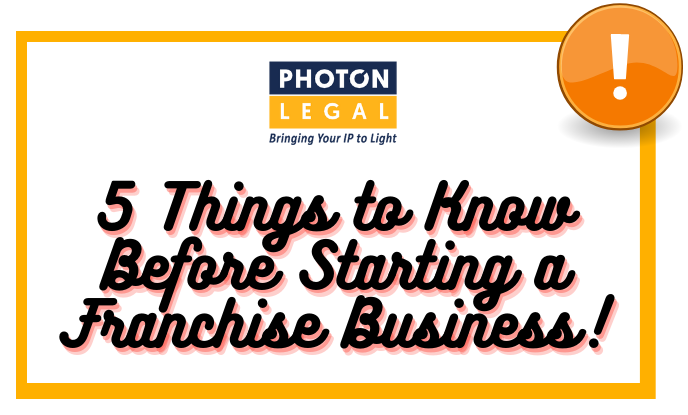
5 Things to Know Before Starting a Franchise Business!
Introduction:
Franchising is one of the fastest-growing business models worldwide. The franchise business model is growing tremendously because it provides a method to own a business without having to establish one from scratch. Franchise businesses have gained a lot of popularity, especially after globalization. Moreover, it is a quick way to extend operations into other geographic areas without bearing a financial burden. Most of the popular food and clothing stores like McDonald’s or KFC follow this franchise business model.
The idea of franchising allows one company to operate under Franchisor's name and use their expertise to create a successful business. It is a good way to invest in a business with a popular name and brand expertise.
Do you know how a franchise business model operates? Arguably, there are a lot of legal agreements and obligations that a franchisor would bring forward before finalizing the deal. As a result, there are 5 factors that a franchisee must keep in mind before finalizing any franchise business deal. Let us discuss these few points in detail through this blog:
What exactly is a franchise business?
A franchise business refers to a business model where the owner licenses its business models, intellectual property, methods, techniques, support etc to the franchisee (the person taking up such right) in exchange for the license fee.
In simple words, it is a business that has a brand name or is governed by Standard Operating Procedures (SOPs), protocols, and management of the franchisor firm. The franchisor firm governing the business is usually a global corporation or multi-national company. When you purchase the rights to create this type of business, you are purchasing the right to employ a tried-and-true business model and system, complete with tested prices, products, and marketing strategies.
Franchisor, franchisee and franchise: What do these terms mean?
Before we proceed in the blog further let’s first understand the meaning of important terms in the franchise business.
Franchisor: Franchisor is the owner of the business, who creates the brand, trade name and business model.
Franchisee: A franchisee is a person who pays a royalty and an upfront fee to seek the right to use the franchisor's name and system.
Franchise: The term "franchise" technically refers to the agreement that binds the two parties, but it is more frequently used to describe the business that the franchisee runs.
Franchising: The process of developing and disseminating a brand through a franchise network is known as franchising.
Types of franchise business:
A franchise can be of different types. However, to understand its categorization under trademark or intellectual property rights it can be categorized into
A] Business model franchise:
The business franchise is the most prevalent kind of franchise. It usually refers to purchasing a company with a well-known brand. In return, The new business owner is required to regularly pay a royalty fee to the franchisor in exchange for the assistance provided, access to skilled specialists, and use of the company name and trademarks.
B] Single-operator franchises or product franchises:
This type of franchise model is common in the business of providing goods or services in a certain trade or sector. The franchisor provides the franchisee with permission to utilise their name and trademarks. Moreover, they also provide the franchisee with regular support and assistance.
C] Industrial franchise:
Industrial franchise are mainly manufacturing franchises, the franchisor permits the franchisee to use their brand name and trademark for manufacturing goods. A soft drink corporation would be the best illustration of this. The franchisor company makes the concentrated form of syrup and then sells it to the franchisee along with the right to utilise its brand name and trademarks.
How is Franchise different from other business models?
The franchise model is distinct from other forms of business as it is already tested with methods that will enable you to turn a profit right away. Moreover, it eliminates the risk as the franchisee invests in an established company model by purchasing an ownership stake in it. The best examples of a successful business model are Fast-food restaurants. You will be shocked to learn that the fast-food sector earns $570 billion annually. This can be linked to the fact that nearly all fast-food establishments today meet customer expectations. Because of this, brands have grown rapidly, and they are now operating across a broad geographic area.
5 points to do while choosing a franchise business!
Here are the five things to do while starting a franchise business:
#1 Analyze the Demand and market trends
The first step is to conduct a study before beginning any new business. The franchise business you invest in, must be marketable and viable before diving in headfirst. Discover whether there is a need for the good or service you plan to supply, whether it is ongoing, or, if not, how long it will "last." Examine the possibilities for the growth of the product you'll be selling.
#2 Clear communication with the franchisor
Before starting a franchise business it is important to discuss the commercial and monetary advantages of both parties. The discussion can be laid down to discuss the financial information, location and profitability. The franchisor responds by outlining the conditions for making his brand available as a franchise, the standards they demand, and the revenue-sharing arrangement.
#3 Producing Legal Documents
The most important aspect is legal paperwork. A franchise agreement or other agreements can be executed to establish the obligations and rights of both franchisees and franchisors. Both parties must actively decide on pricing, franchise agreements, and intellectual property protection before executing any legal documents.
#4 Taking necessary permissions and licenses
To establish any business there are various permissions and licenses required from the local authorities of that area. To open a franchise shop in a public space, the franchisee will require several pertinent permissions.
#5 Registering Business
As soon as the franchise agreement gets executed with the franchisor, you must register your business with the Ministry of Corporate Affairs. Additionally, if the franchisor stays outside the country then they must communicate with foreign brokers to complete the registration procedures.
What makes Franchising so popular and beneficial
There are various benefits of opting for a franchise business such as:
- There are tried-and-true techniques which is why it is easy for the franchisee to invest in a company that has already proven itself in the market.
- The existing market recognition gives the new business owner a significant competitive edge because customers and business partners are already aware of the brand's values.
- A franchisee can always turn to their franchisor for assistance and get the support they require in a particular area of managing their firm.
- Banks are more inclined to provide financing to aspiring franchisees because franchising is typically a safer means of growing a firm than just individually pursuing a business idea.
Bottom line
There are so many franchises that are ruling the world currently. They are earning huge profits across the globe. Nowadays, a franchise business is not only a form of business style but also a status symbol for consumers as well as investors.
Lastly, it is always good to have a good legal understanding before implementing a franchise business as that will help you to minimise misunderstanding and inconvenience later. Reach out to us to know more through LinkedIn and our website.
On this page
Relevant reading for smart FMCG and tech brands.
View All

Are you trying to figure out why investors value patents? Intellectual property is undoubtedly...

Are you trying to figure out why investors value patents? Intellectual property is undoubtedly...

Are you trying to figure out why investors value patents? Intellectual property is undoubtedly...
You could spend the next 3 years following up on patent applications.
Want to exit, scale, or sleep better? Start with faster IP protection.
Let’s talk before someone else owns what you’ve built.
Is your IP at risk because of delayed patents?
Or you could get Pulse by Photon Legal. Our interactive platform helps take you from idea to patent in <11 months.
.svg)
.svg)
.svg)
.svg)
.svg)














